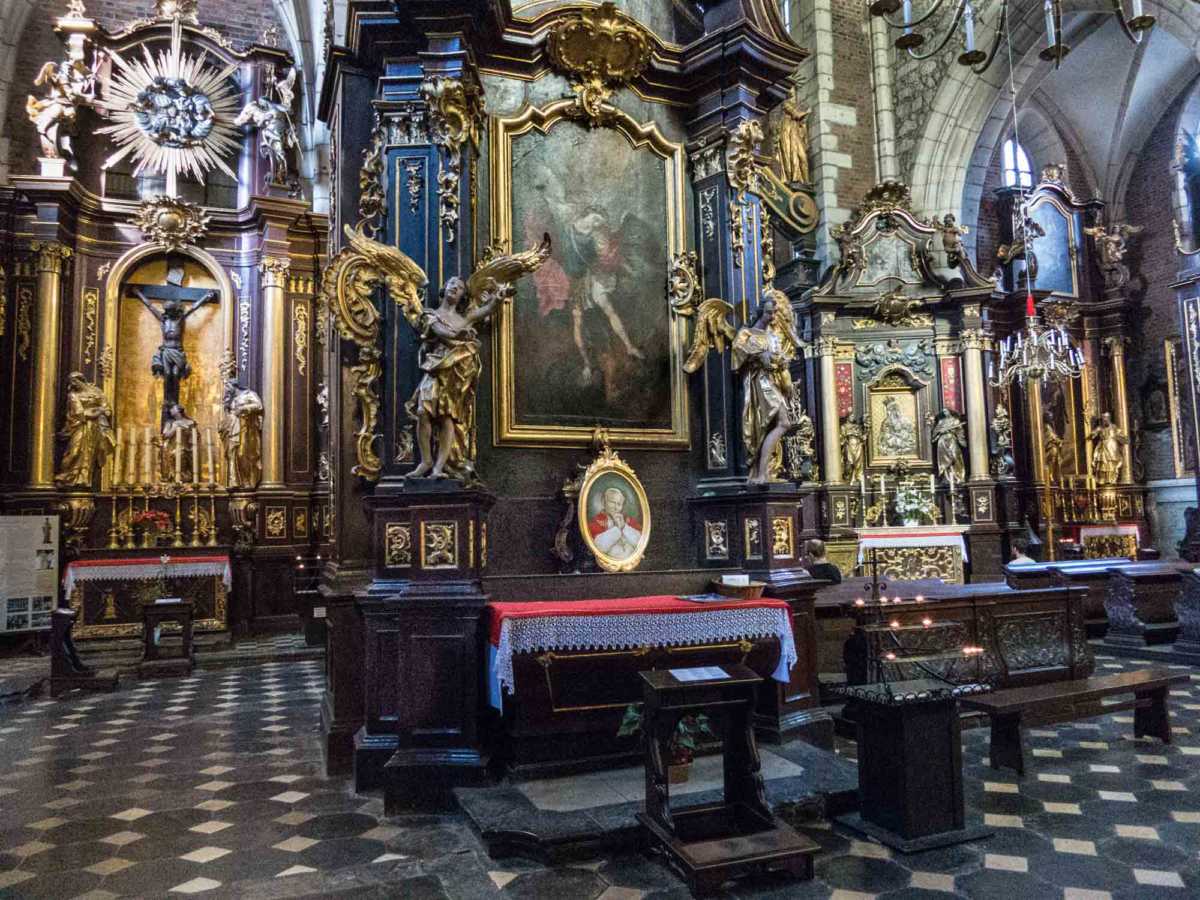Saint John Paul II
Introduction
“Everyone knows John Paul II: his face, his characteristic way of moving and speaking; his immersion in prayer and his spontaneous cheerfulness. Many of his words have become indelibly engraved in our memories, starting with the passionate cry with which he introduced himself to the people at the beginning of his pontificate: ‘Open wide the doors to Christ, and be not afraid of him!’ Or this saying: ‘No one can live a trial life; no one can love experimentally.’ An entire pontificate is condensed in words like these. It is as though he would like to open the doors for Christ everywhere and wishes to open up to people the gate that leads to true life, to true love.” - Pope Emeritus Benedict XVI
The life of a saint is one in which the Gospel is luminous. In this way, the Church has received an inestimable gift in St. John Paul II. Through his life, he has shown the radiation of the fatherhood of God in humanity, or what St. Paul calls the "newness of life in Christ" (Cf. Rom. 6: 4).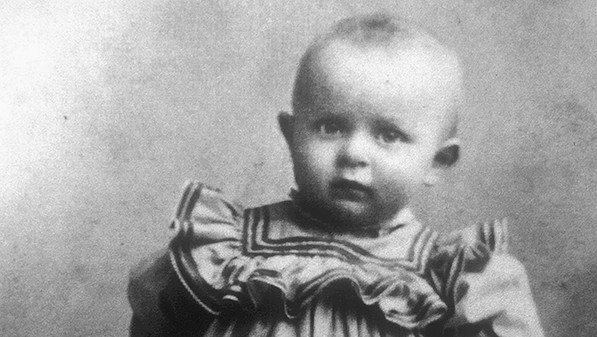
Karol Józef Wojtyła is pictured as a boy in Wadowice, Poland. (CNS photo)
Childhood
“I had not yet made my First Holy Communion when I lost my mother: I was barely nine years old.” — Karol Wojtyła
Karol Józef Wojtyła was born on May 18, 1920, in Wadowice, Poland, the youngest of three children. Although he was born into a loving family, his early life was marked by suffering and loss. His older sister, Olga, died in infancy and, by the time Karol was twelve, his mother Emelia had died of kidney failure and his older brother, Edmund, had died heroically serving those stricken with scarlet fever. Known to his friends as Lolek, and growing under the loving guidance of his father, he was a vibrant youth, athletic, studious and a gifted theatrical performer.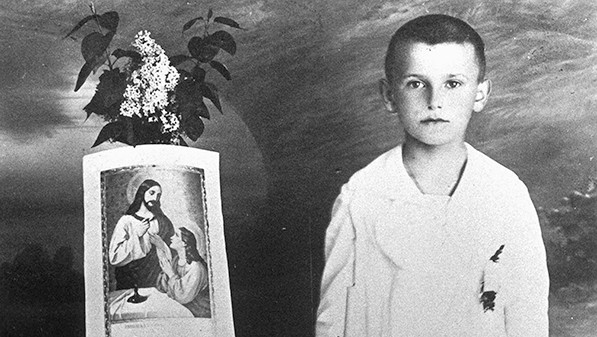
Karol Józef Wojtyła is pictured at his first Communion May 25, 1929. (CNS photo) 
This portrait of young Karol Józef Wójtyła appeared in a poster for the Studio 39 theater group. (CNS photo/Catholic Press Photo)
Young Man
“My father’s words played a very important role because they directed me toward becoming a true worshiper of God.” — Karol Wojtyła
“After her death and, later, the death of my older brother, I was left alone with my father, a deeply religious man. Day after day I was able to observe the austere way in which he lived …his example was in a way my first seminary, a kind of domestic seminary.” — Karol Wojtyła
Young Karol attended Kraków’s Jagiellonian University in 1938 where he studied Polish language, literature, theater and poetry. He also performed in local theatrical productions, co-founding the Rhapsodic Theater of Kraków. It was during this time that he met his spiritual mentor, Jan Tyranowski, and was introduced to the Carmelite mysticism of St. John of the Cross. This meeting profoundly changed the course of his life, leading him to the priesthood. However, his studies were interrupted when Nazi Germany invaded Poland in September 1939.
In order to remain in the country, Karol was forced to work in a stone quarry as well as night shifts at the Solvay chemical plant. During this time, Karol suffered the loss of his father, who died of a heart attack on February 18, 1941. In 1944, he miraculously survived being hit by a German truck. Through all this, he recounts the maturing of his vocation and the formation of his priestly identity.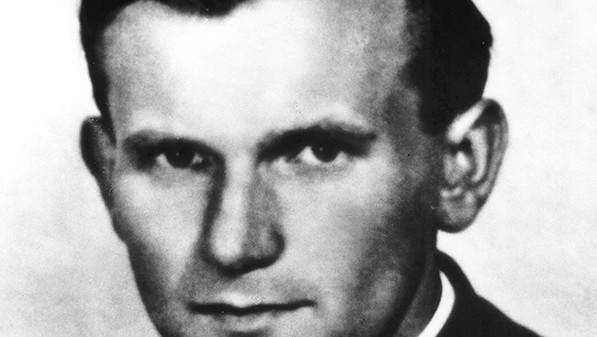
Karol Józef Wojtyła is pictured around the time he became a priest. (CNS photo)
Priest / Bishop
“As a young priest I learned to love human love… If one loves human love, there naturally arises the need to commit oneself completely to the service of ‘fair love,’ because love is fair, it is beautiful.” — Pope John Paul II
Karol joined a clandestine seminary headed by Cardinal Sapieha and was ordained alone on the Feast of All Saints in 1946. He then traveled to Rome to continue his doctoral studies. Upon his return to Poland he was made assistant pastor of a parish in Niegowic, where he began his vital work with young people.
After teaching in the Jagiellonian University for approximately five years and having been appointed to the Chair of Ethics at the Catholic University of Lublin, Fr. Wojtyła was consecrated auxiliary bishop of Kraków on July 4, 1958 - the youngest bishop in the history of Poland. Among the first to hear of his election were the young people who had accompanied him on many camping and hiking trips.
Constantly concerned with the question of man, Bishop Wojtyła encouraged a spiritual and cultural resistance to the Communist occupation of Poland, giving his countrymen hope in the face of grave oppression.
Bishop Wojtyła attended the Second Vatican Council beginning in 1962, where he provided a vital support to the seminal documents of the Council. His insight and gifts were also central in the final formulation of Humanae Vitae, which was promulgated by Pope Paul VI in 1968. Soon after, he was elevated to the College of Cardinals.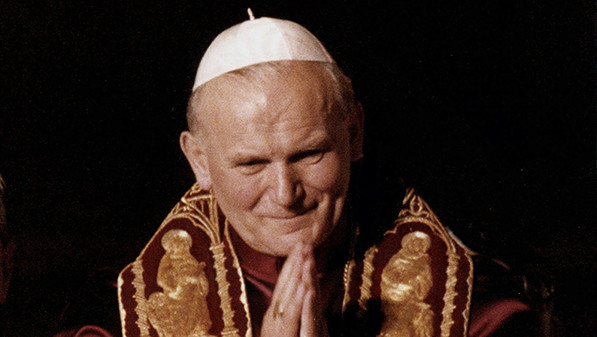
Pope John Paul II appears from St. Peter's Basilica following his election the evening of Oct. 16, 1978. (CNS photo/Catholic Press Photo)
The Early Papacy
“Do not be afraid! Open wide the doors for Christ…. Christ knows ‘what is in man.’ He alone knows it.” — Pope John Paul II in his Inaugural Address, St. Peter’s Square, October 22, 1978
Cardinal Wojtyła was elected Pope on October 16, 1978, and took the name John Paul II. He was the 263rd successor to Peter, and was to have one of the longest pontificates in the history of the Church, lasting nearly 27 years. He retained his Episcopal motto, drawn from the profound insight of St. Louis de Montfort, “Totus Tuus – I am completely yours.” It would become increasingly clear to the world that this papacy was an incarnation of that motto and a direct response to Divine Love, which was profoundly expressed in his love for man.
Immediately, John Paul II went out to the entire world with a vigorous missionary spirit. He embarked on 104 apostolic journeys to 129 different countries, “to the uttermost parts of the earth” (Acts 13:47), beginning with the West, Mexico and the United States, for the sake of the Gospel. His love for young people led him to establish World Youth Day, celebrated 19 times during his pontificate, which attracted millions of young people from all over the world. The Pope’s concern for marriage and the family was clearly expressed in the establishment of the World Meeting of Families, his Wednesday catechesis on human love and the founding of the Pontifical John Paul II Institute for Studies on Marriage and Family.
The Pope’s presence on the world stage began the gradual and peaceful removal of Communism from Eastern Europe, averted war between the nations of Chile and Argentina, and began the restoration of peace and the healing of division between the major world religions.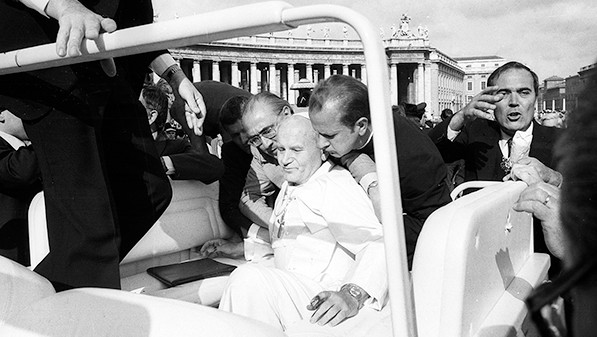
Pope John Paul II is assisted by aides after being shot in St. Peter’s Square in 1981. (CNS photo/L'Osservatore Romano)
Assassination Attempt
“In everything that happened to me on that day, I felt (the Mother of God’s) extraordinary motherly protection and care, which turned out to be stronger than the deadly bullet.” — Pope John Paul II
On May 13, 1981, Pope John Paul II was the victim of an attempted assassination in St. Peter’s Square. Shocking the world, he exhibited extraordinary love and forgiveness when he made a personal visit to his attacker, Ali Agca, in Rebibbia Prison in 1983. Following his recovery, Pope John Paul II continued with his missionary activity, meeting with more than 17,600,000 pilgrims during General Audiences and countless millions of faithful during his subsequent pastoral visits throughout the world. He continued to meet with numerous government leaders during 38 official visits and 738 audiences and meetings held with heads of state, including two landmark speeches at the United Nations and 246 audiences with prime ministers.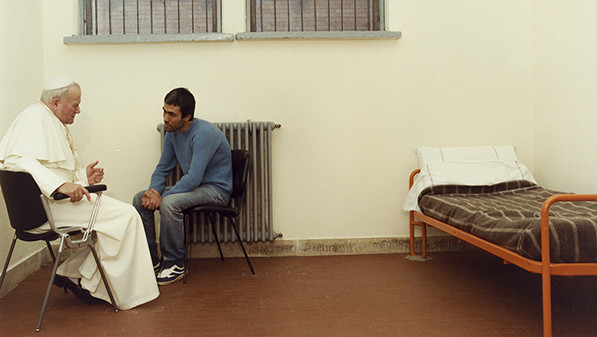
Pope John Paul II sits with his would-be assassin, Mehmet Ali Agca, in Rome's Rebibbia prison in 1983. (CNS photo/Arturo Mari, L'Osservatore Romano) 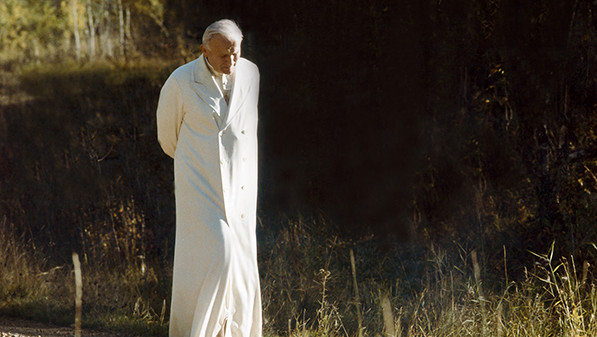
Pope John Paul II walks down a gravel path in an undated photo by Vatican photographer Arturo Mari. (CNS photo/L'Osservatore Romano)
Legacy
“The answer to the fear which darkens human existence at the end of the twentieth century is the common effort to build the civilization of love…. With the help of God’s grace, we can build in the next century and the next millennium a civilization worthy of the human person, a true culture of freedom. We can and must do so!” — Pope John Paul II in his address to the United Nations
John Paul II’s doctrinal legacy is one of the richest in the history of the Church. He tirelessly guarded the deposit of faith and the tradition of the Church from errors, promoting authentic theological, moral and spiritual doctrine.
St. John Paul II was also a prolific writer; among his principal documents are many treasures of the Church. His writings included 14 encyclicals, 15 apostolic exhortations, 11 apostolic constitutions and 45 apostolic letters in addition to the catecheses delivered in the general audiences, lectures and homilies given during his many travels.
With his emphasis on the universal call to holiness, he beatified 1,338 people and canonized 482 saints, more than all of the popes in the last 500 years combined.
"Pope John Paul II meets with Jewish, Muslim leaders in Jerusalem in 2000" src="https://www.jp2shrine.org/jps/images/about/2000-with-jewish-muslim-leaders.jpg"/>
Pope John Paul II meets with Jewish, Muslim leaders in Jerusalem in 2000. (CNS photo/Arturo Mari, L'Osservatore Romano)
The Great Jubilee
“The whole of the Christian life is like a great pilgrimage to the house of the Father, whose unconditional love for every human creature, and in particular for the ‘prodigal son’, we discover anew each day…. The Jubilee…should encourage everyone to undertake…a journey of conversion.” — Pope John Paul II
Throughout his pontificate, Pope John Paul II guided and prepared the Church to celebrate the Great Jubilee, a celebration of the mercy of God and the forgiveness of sin, which began with the opening of the Holy Door of St. Peter’s Basilica. Eight million pilgrims came to Rome to pray during the Year 2000, as the Church and the whole of humanity passed into the third millennium since the birth of the Redeemer.
During this time, Pope John Paul II prayed for God’s forgiveness and for the forgiveness of those wounded by the sins of Christians throughout the past two millennia.
John Paul II successfully encouraged dialogue with the Jews and inaugurated a time of healing between Jews, Muslims and representatives of other religions. Several times he extended an invitation for these groups to participate in worldwide meetings to pray for peace.
With the Year of the Redemption, the Marian Year and the Year of the Eucharist, he devoted himself to the spiritual renewal of the Church. He was convinced that the Church would receive courage and refreshment, even in the face of the great trials of humanity experienced in the last century, by drawing near the Heart of Christ in the Eucharist. He stated, “...The gaze of the Church is constantly turned to her Lord, present in the Sacrament of the Altar, in which she discovers the full manifestation of his boundless love” (John Paul II, Ecclesia de Eucharistia, 2003).
The love of Christ, “that love which goes to the end,” proclaimed by St. John Paul II with his entire life, was made increasingly comprehensible to the world as the day of his return to the Father’s House drew near.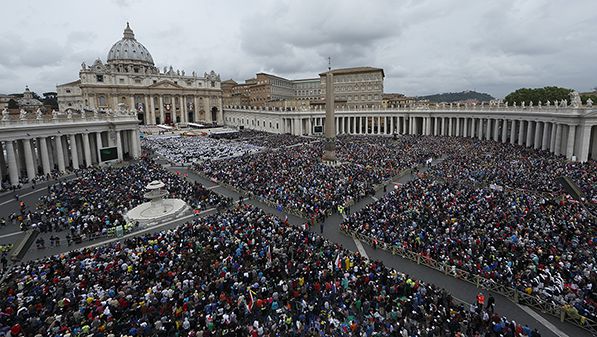
Pope Francis celebrates the canonization Mass of Sts. John XXIII and John Paul II in St. Peter's Square at the Vatican April 27. (CNS photo/Paul Haring)
Death and Beatification
“Death itself is anything but an event without hope. It is the door which opens wide on eternity and, for those who live in Christ, an experience of participation in the mystery of his Death and Resurrection.” — Pope John Paul II
Suffering from the debilitating effects of Parkinson’s disease, the aftereffects of the wounds from the attempted assassination, multiple surgeries, and the loss of his voice, Pope John Paul II expressed in his last days the mystery of the Crucified Lord.
With hundreds of thousands of young people beneath the window of the papal apartment keeping candlelight vigil during the pope’s final agony, John Paul II whispered in response, “I have looked for you and you have come to me. Thank you.” Pope John Paul II died during the first vespers of Divine Mercy Sunday, April 2, 2005, at 9:37 p.m., soon after he had uttered his final audible words, “Let me go to my Father’s house.”
More than three million pilgrims traveled to Rome to pay homage to the pope, some standing in line for over 24 hours to pray in thanksgiving for their beloved Holy Father.
On April 28, 2005, Pope Benedict XVI announced that the normal five-year waiting period before beginning the cause of beatification and canonization would be waived for John Paul II. On May 1, 2011, Pope Benedict XVI beatified Pope John Paul II, and Pope Francis canonized Saint John Paul II alongside Saint John XXIII on April 27, 2014.
“We can be sure that our beloved Pope is standing today at the window of the Father’s house, that he sees us and blesses us.” — Pope Benedict XVI, at the Funeral Mass for Pope John Paul II, April 8, 2005.
